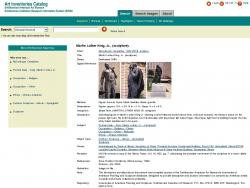Susan Ogilvie's collections
Access Series: Nostalgic Popular "Pop" Culture 1950s-2000s
<p>This inspiration collection of nostalgic popular "pop" culture from the 1950s, 1960s, 1970s, 1980s, 1990s and 2000s—super heroes and super villains, Muppets, cartoon characters, Star Wars, Disney and Pixar characters, Transformers, and movies was used for a collage activity and discussion prompt in an informal learning activity, "Me & My World: Personal Ecology/Interest Inventory" with a group of teens with cognitive and intellectual disabilities. Students were asked about their favorite pop culture influences from the past and present. Use the visible thinking routine, "See|Think|Wonder" as a starting point for a discussion prompt, and the images for inspiration. </p><p>Tags: decision-making, self-determination, student empowerment, disability, All Access Digital Arts Program</p>
 Susan Ogilvie
Susan Ogilvie
97
Conflict and Compromise: The Vietnam War
<p>This collection brings together <a href="https://edsitement.neh.gov/">EDSITEment</a> and Smithsonian resources to support the initial research into a project for National History Day 2018, "Conflict and Compromise in History."</p>
<p>These resources - including protest posters, archival photographs, interviews, artwork, and articles - explore the topic of the Vietnam War from multiple perspectives. Resources highlight politics, the experience of soldiers, anti-war protests, and artwork created in reaction to the Vietnam War. The second tile of this collection contains questions to help with both the analysis of this historical event and the analysis of different types of resources (photograph, document, artwork, portrait, and object). The third tile contains a graphic organizer, created by <a href="https://nhd.org/">National History Day</a>, to help explore historical context and the "Conflict and Compromise in History" theme.</p>
<p>By no means is this collection comprehensive; instead, it provides a launching point for further research.<br /></p>
<p>This collection was created in collaboration with <a href="https://edsitement.neh.gov/">EDSITEment</a>, a website for K-12 educators from the National Endowment for the Humanities.</p>
<p>Share your National History Day collections and let us know what you think! Write to us on Twitter: <a href="https://twitter.com/EDSITEment">@EDSITEment</a> & <a href="https://twitter.com/smithsonianlab">@SmithsonianLab</a>, #NHD2018. If you publish a collection on your National History Day topic, be sure to enter #NHD2018 in the description!</p>
<p>Tags: ho chi-minh; lyndon b. johnson; richard nixon; walter cronkite; henry kissinger; veteran; oral history; viet cong; protest; peace; 50s; 60s; 70s; 20th century; 1900s; national endowment for the humanities; nhd; #NHD</p>
 Susan Ogilvie
Susan Ogilvie
84
The Black Power Movement
<p>Teaching about the Black Power Movement can be challenging, but has rich rewards. Misconceptions about the Black Power Movement abound, but the ability to contrast their strategies and aims with the earlier Civil Rights Movement allows Social Studies teachers to discuss the complex ways that social movements evolve, change, and respond to the times. In addition, a study of the Black Power Movement helps give context for a broader study of the economic and political shifts in the 1970s and 1980s and the rise of identity politics. This teaching collection includes a variety of resources that could be used to teach about the Black Power Movement, organized into sections for:</p><p>-People in the Movement</p><p>-Goals and Strategies of the Movement</p><p>-Teaching Activities</p><p>General guiding questions for this collection include:</p><p>-What were the distinct problems that the Black Power Movement tried to address? Do they remain today?</p><p>-What were the strategies of the Black Power Movement? Do you agree or disagree with these? </p><p>-Why and how do social movements develop and evolve? </p><p>-What defines a successful social movement? Was the Black Power Movement successful?</p><p>- Can a social movement survive beyond the demise of its leadership?</p><p>-What is the role of the arts in promoting the ideals of social movements?</p><p>This is a work-in-progress based on the digitized materials within the Smithsonian Learning Lab's collection--it is not meant to be wholly definitive or authoritative.<br /></p>
 Susan Ogilvie
Susan Ogilvie
31
Remembering the Civil Rights Movement
<p>This is a collection of monuments, memorials, paintings, and other ways to remember the Civil Rights Movement. Go through the collection and selection your 3 favorite (and delete the rest). Now that you have your 3, create 6 hotspots between them explaining how they work to help tell the story of the Civil Rights Movement.</p>
 Susan Ogilvie
Susan Ogilvie
23
The Women's Movement
<p>This collection shows the successes of the Womens Movement during the 1960s and 1970s<br /></p>
 Susan Ogilvie
Susan Ogilvie
6







